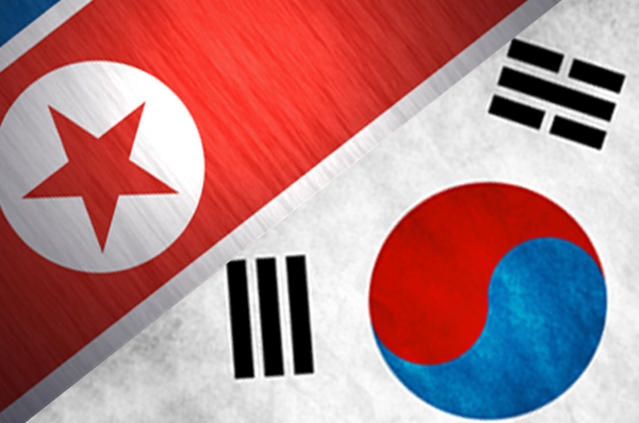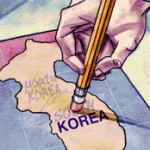Dying Dreams of Korean Unification


On July 23rd, 1953, little over three years after the Korean War was started by North Korea’s surprise attack, the Korean peninsula was divided. The end of the Korean War was the beginning of a division which lasted for more than half a century to this day. The onset of the Cold War created two vastly different trajectories for North and South Korea. Powerless, Koreans were unable to form a unified government, separated by the hegemony of the two major super powers’ interest in the region. The South, embraced capitalistic and democratic ideas, whereas their counterparts, the North, embraced communism and military dictatorship. At present, South Korea is one of the most successful and prosperous states in Asia, whereas North Korea is now a rogue state that hampers regional order. Despite these differences, both Koreas have set “unification”[1] as their ultimate goal, an aim incorporated into the constitution of both countries. Despite the purported aim of both North and South Korea, unification was not achieved. To understand why Korea failed to unify, one must consider the “sincerity” of unification policies, the mindset of the leaders, and public interests. The variables mentioned above were overwhelmed by selfish motives which failed to transcend differences.
With this in mind, this essay explores the multi-dimensional failures of Korean unification. First, it will critique the flaws in Korean unification policy, especially regarding the 1972 South-North Joint Statement. Second, it will explain, by using the game theory of prisoner’s dilemma, the distrust between the two Koreas. In order to solve the Korean issue, there is a need to transcendence differences, to overcome suspicion, hate, and distrust. The lack of confidence in the sincerity of each counterparty ultimately hindered any chance of unification. Third, this essay will analyze the changing views on unification, especially from South Korea. The younger generation of South Koreans, who will most likely have to bear the cost of unification, have no emotional links with North Korea. They have no memories of a unified Korea and they are not willing to risk their economic prosperity for a unified Korea.
1972 Flaws in South-North Joint Statement
The 1972 South-North Joint Statement was a broad agreement between South and North Korea on unification policies. It stated: 1) Unification must be achieved with no reliance on external forces or interference. It must be achieved internally. 2) Reunification must be achieved peacefully without the use of military force against the other side. 3) Both parties must promote national unity as a national goal despite any differences in ideological and political systems.[2] These statements obscured the ulterior motives of both North and South Korea.
The true motive of the 1972 South-North Joint Statement was not in unification, but rather lay in assuring the security of both countries. This statement was the direct result of America’s normalization of relationship with China which threatened the existence of both Koreas. Diplomatic normalization with China posed a different problem: approximately 30% American soldiers were pulling out of South Korea as a sign of trust to the Chinese government.[3] Vice versa, China’s role as an ideological ally of North Korea was significantly diminished. With these rapid changes and potential uncertainty, South and North Korea felt compelled to sign a security agreement to assure the sovereignty of both countries. However, since this agreement was never really signed in good faith, almost all the articles of the agreement were violated. This agreement was in other sense, was an implicit way of saying, “let each of us pursue our own paths.”
Prisoner’s Dilemma in the Korean Peninsula
Prisoner’s dilemma is a situation where both prisoners would benefit more if they cooperated. However, because each prisoner does not trust the other, each prisoner elects to choose the second best option. This is exactly the situation with North and South Korea. A long history of distrust and hatred has prevented both sides from cooperating.
Possible Game Matrix for Unification
| South Korea / North Korea | Trust | Defect |
| Trust | Gain for both | Loss for South Korea |
| Defect | Loss for North Korea | Loss for both |
From South Korea’s point of view, the reasons for the suspicion dates back to North Korea’s surprise attack in 1950. During the Korean War, South Korea’s capital, Seoul, changed hands three times. Koreans on both sides experienced the tragedy of fratricide and both sides committed atrocities. Local communists punished “capitalists” and capitalists took revenge on the “red elements” as both armies advanced and retreated. Each side blamed the other.[4]
Secondly, ill-fated attempts by some of Korea’s independence fighters such as Kim Gu and Kim Kyu-Sik to form a unified national government with North Korea’s communists created dissent in the South. Many South Korean leaders such as Sygnman Rhee, Chang Myong, and Park Chung-Hee were deeply skeptical about North Korea. Both the incumbent party and opposition parties led by Yoon Bo-Sun, Lee Chul-Sung, and others were staunchly anti-communist. Common distrust of North Koreans made it almost impossible to create a positive environment to discuss reunification.[5]
North Korean leaders also did not trust South Korean leaders. North Korean leaders, such as Kim Il Sung, Choi Yong Kon, Park Sung Chul and many others fought against the Japanese Empire, and many of their companions were tortured or executed. On the other hand, many South Korean leaders did not have the same legitimacy. South Korean leaders, such as Prime Minister Chang Myong, collaborated with the Japanese authorities. President Park Chung Hee and former Speaker of National Assembly, Chung Il Kwon, were army officers in the Japanese Empire. North Korean leaders viewed South Korean leaders to be traitors and opportunists, making political negotiation more difficult.[6]
Due to the reasons mentioned above, both Koreas today maintain very large military forces in order to secure their borders. South Korea violated the first principle of the 1972 South-North Joint Statement by allowing external forces (US troops) to be stationed in Korea. On the other hand, North Korea developed nuclear weapons which threatens and holds hostage Seoul, the capital of South Korea.
Current Situation
Historically, there was a strong desire for unification in South Korea. However, this desire has waned and in a recent survey in 2014, 42.7% of university students responded “no” to reunification due to the potential economic hardships that will hit South Korea.[7] Young male Koreans who are drafted for military duty were disillusioned and angered by North Korea’s recent transgressions – the unprovoked surprise attack and sinking of South Korea’s patrol corvette, Cheonan, and the bombing of Yeonpyong island which targeted civilians for the first time since the end of the Korean War.
Unlike West Germany, South Korea does not have a unification tax. President Lee Myung-Bak proposed this tax in a bill in 2010; however, domestic opposition pressured the government and prevented the passage of this bill.[8] This reflects public sentiment and the lack of interested in unification. Even though Germany prepared for unification, collecting taxing 10 years prior to the fall of East Germany, tax reserves were still not sufficient.[9] Considering that West Germany in comparison to South Korea was a much richer state and how East Germany at least had a much better economic infrastructure than North Korea, the cost of Korea’s unification is simply unpredictable.
Conclusion
Despite both Koreas’ pledge, as stated in the South-North Joint Communiqué of 1972, to seek “transcending differences on ideas, ideologies and systems,” it is an empirical fact that such a “transcending ideology” has never materialized. Throughout history, the integration and disintegration of a state has been very much a part of political events in human civilizations. A peaceful integration, however, transcending ideological difference between communism and capitalism, has never occurred in the international political arena.[10] Germany’s unification was the direct result of Soviet Bloc’s collateral collapse, not because of both German states mutually agreed to transcend ideological differences.
Mutual hatred and distrust between the two Koreas also played a major role in why the unification process failed to initiate. Although it was the North Koreans who launched a surprise attack, North Korea and South Korea blamed each other for their atrocities during the Korean War. Leaders of both sides failed to trust each other because North Korea negated attempts at a unified government proposed by Kim Gu, and the events of the Korean War alarmed South Korean military leaders to be cautious of North Korea. Ultimately, North Korean leaders viewed themselves as the only legitimate government of Korea and viewed South Korean leaders as collaborators and traitors who worked under the Japanese Empire and helped Japan exploit Korea.
——————————-
[1] Article 4 of South Korean Constitution: The Republic of Korea shall seek unification and shall formulate and carry out a policy of peaceful unification based on the principles of freedom and democracy
Article 9 of North Korean Constitution: The DPRK shall strive to achieve the complete victory of socialism in the northern half of Korea by strengthening the people’s power and vigorously performing the three revolutions- the ideological, cultural, and technical– and reunify the country on the principle of independence, peaceful reunification and great national unity.
[2] “Joint Statement of North And South.” Joint Statement of North and South (Le Monde Diplomatique, ). Web. 6 Nov. 2014. .
[3] Nam, Joo. America’s Commitment to South Korea: The First Decade of the Nixon Doctrine. Cambridge: Cambridge UP, 2010. Print. p. 78
[4] “Issues and Problems of Korean Reunification.” Korean Reunification: New Perspectives and Approaches. Ed. Tae-Hwan Kwak, Chonghan Kim, and HoonNack Kim, Seoul: Kyungnam University, 1984. Print.
[5] ibid.
[6] ibid.
[7] 강근주. “대학생 42.7% 남북통일 반대… 이유 1위, 경제 부담.” <에너지 경제>, 2014년 10월 28일 작성.
[8] 채원배. “李대통령 “통일세 준비할 때 됐다” <머니투데이>, 2010년 8월 15일 작성.
[9] 이상원. “李대통령 언급 ‘통일세’는 무엇?”, <조세일보>, 2010년 8월 16일 작성.
[10] ibid. “Korean Reunification: New Perspectives and Approaches.”
Image Sources:
1) Eberstadt, Nicholas. “The North Korea Endgame.” The Wall Street Journal. Dow Jones & Company. Web. 6 Nov. 2014.
2) “Is Another Korean War Inevitable? South Korea’s Defense Ministry Warns North Korea
To Strike Back If It Launches A Nuclear Attack.” Carbonated.TV. Web. 6 Nov. 2014.
<http://www.carbonated.tv/news/is-another-korean-war-inevitable-south-koreas-defense-
ministry-warns-north-korea-to-strike-back-if-it-launches-a-nuclear-attack>.
